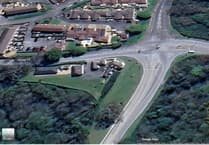NEWTON Abbot will be going pesticide free following a decision by town councillors.
Their vote in favour of banning the chemicals means that an eco-friendly state-of-the-art hot foam machine will now be used for weeding.
In addition, the council will consider reduced mowing and plant removal to allow wildflowers to flourish and provide a greater nectar resource for bees and other pollinators.
The authority is also working with Green Futures Newton Abbot, Teignbridge District Council and SUEZ Recycling and Recovery UK to pilot the Pesticide-Free Bradley initiative, encouraging the use of insect-friendly alternatives in gardens and homes.
A Pesticide-Free Gardening Guide is due to be published and will contain guidance from organic gardeners and growers.
A ‘Pesticide Amnesty’ will be held later this year with a kerb-side collection service across Bradley ward for residents to dispose of unwanted weedkillers and similar products.
Mayor Cllr David Corney-Walker, an experienced beekeeper, said: ‘I am delighted our town council has voted to adopt this new and much greener method.
‘Across the UK and globally we have been experiencing a concerning decline in pollinating insects over the last 50 or more years.
‘I’m told that in parts of the world the populations of some insects have plummeted by 98 per cent since the 1970s and across the UK there have been declines of between 45 to 91 per cent in butterfly populations and an average of 11 bee species lost per square kilometre.
‘Newton Abbot Town Council is now doing its bit to help reverse this worrying decline and I’d encourage all households to follow suit.’
Andrew Rothery, Green Futures Newton Abbot Co-ordinator, said: ‘Pollinators are essential for maintaining the fertility of most plant species across our ecosystem and are estimated to be needed for at least 75 per cent of global crop production.
‘This means that declines in pollinators have a direct impact on our ability to feed ourselves, as well as impacting on most other animals and birds in our local environment.
‘One of the main causes of pollinator decline across the UK and the rest of the world is the increasing use of pesticides. I welcome the town council’s decision to be part of the solution.’





Comments
This article has no comments yet. Be the first to leave a comment.